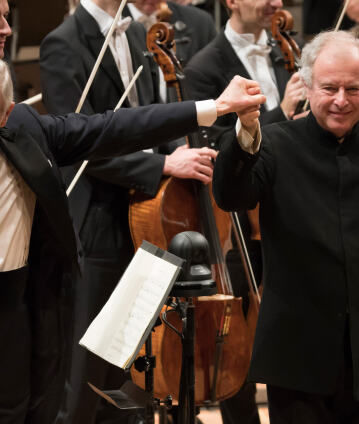Bartók and Brahms with Herbert Blomstedt and András Schiff

Béla Bartók’s Third Piano Concerto is one of the most touching of the 20th century. The gravely ill composer found his way to a tone for which he had not previously been known: more melodic, softer, almost religious. András Schiff, a favourite of the Berlin audience and closely bound to Bartók through his shared Hungarian origin, interprets the work with Herbert Blomstedt, who conducts Johannes Brahms’s First Symphony afterwards.
Both the conductor Herbert Blomstedt and the pianist András Schiff have been partners of the Berliner Philharmoniker for many years. But here they are performing jointly in the orchestra’s concerts for the first time. What also makes this concert programme special: the two artists are presenting themselves with works that they have never yet performed with the Berlin Philharmonic. At concerts of the Berliner Philharmoniker Foundation in recent years, András Schiff has enthralled with his cycles, at which he played Johann Sebastian Bach’s keyboard works, all of Ludwig van Beethoven’s sonatas and the last three sonatas each by Joseph Haydn, Wolfgang Amadeus Mozart and Beethoven, or as Artist in Residence and interpreter of Bach’s and Mozart’s piano concertos, which he not just performed on the piano but also conducted. This time, András Schiff is the soloist in Béla Bartók’s Third Piano Concerto – a composer to whom the pianist feels closely bound, and not only because of the shared Hungarian origin. Schiff says being Hungarian eases comprehension of Bartók’s music, which very strongly reflects the accentuation, the rises and falls of the Hungarian language. Schiff calls Bartók’s Third Piano Concerto, which the critically ill composer composed in exile in New York shortly before his death, a “swan song”. Bartók surmounted the radical character of the two previous concertos and found his way to a tone for which he had not been known previously: more melodic, softer, almost religious.
Herbert Blomstedt, known to the Philharmonic audience first and foremost for his interpretation of the works of Beethoven and Bruckner, presents himself as Brahms interpreter with the orchestra for the first time. The Swedish-American conductor already discovered his love of the late romantic composer in his early years. Ever since, Brahms’s symphonic work has constituted a constant source of the new, the surprising, the ambiguous. With his First Symphony, with which he struggled for almost 15 years, Brahms established himself as a worthy successor to Ludwig van Beethoven. With regard to formal concepts and orchestral line-up, he took over the standards of the Viennese classical composer; the heroic, monumental spirit that marks the symphony also seems to be heard from him. At the same time Brahms reveals his very own compositional style in this work. Characteristically, the themes and motifs of the work are developed, varied and transformed from one motivic “germinal cell”.
© 2017 Berlin Phil Media GmbH
Related interviews